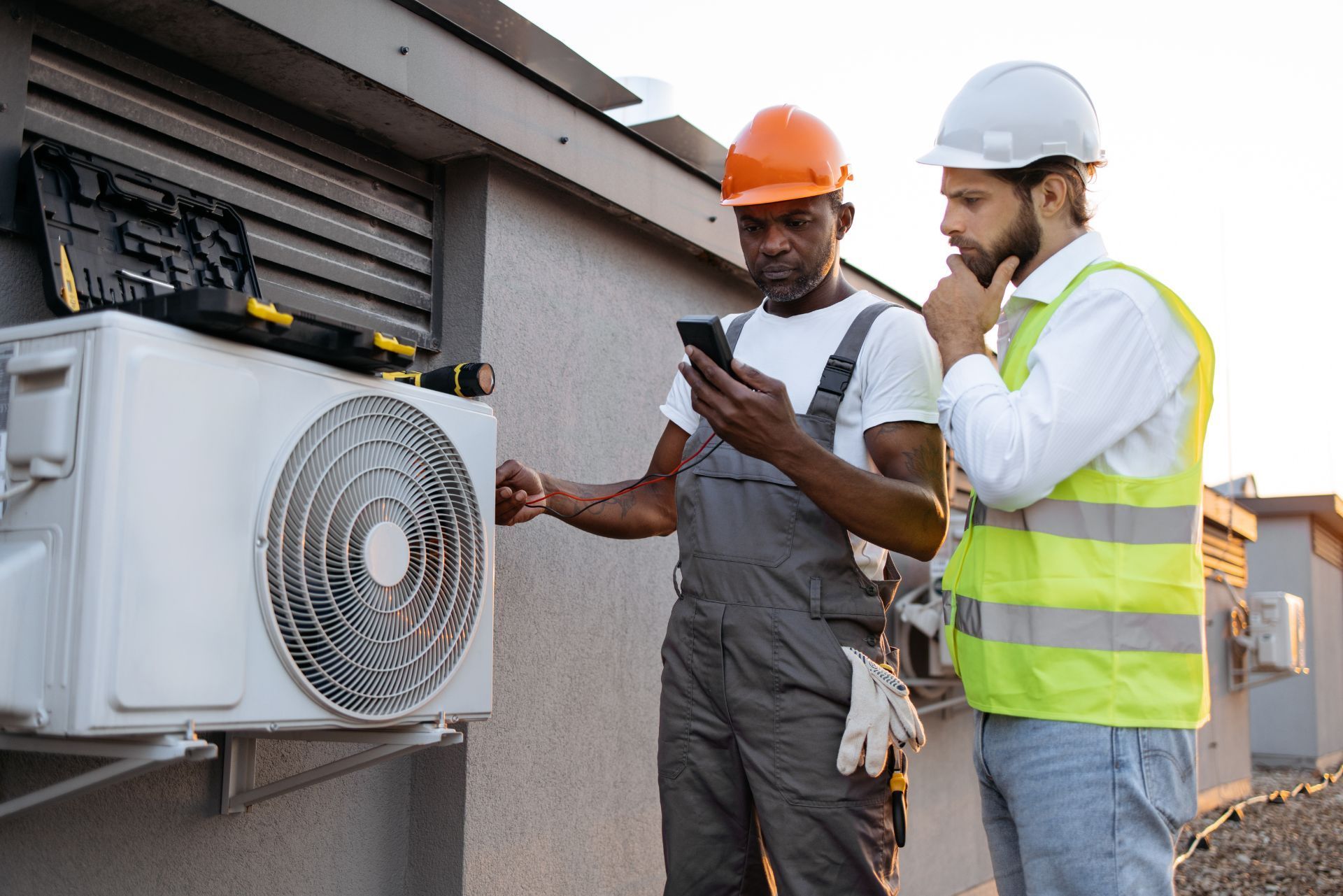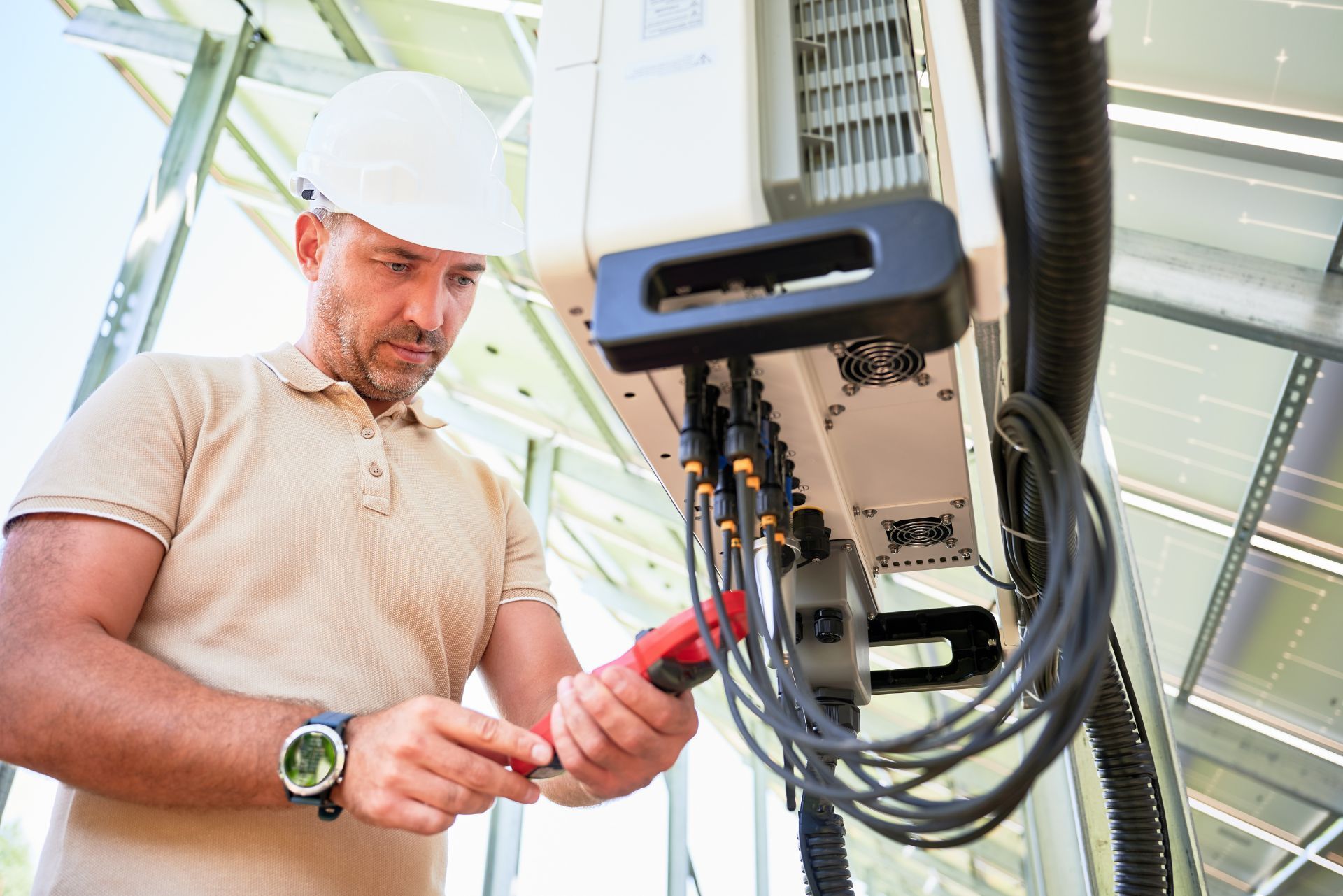Top 3 Recommended Policies

New Jersey’s HVAC industry is growing fast as both homeowners and businesses invest in modern heating and cooling systems. That growth creates opportunity for contractors across the state, but it also brings new challenges. Property damage, workplace injuries, and rising insurance costs can quickly disrupt operations if your business is not properly protected. This guide explains what HVAC contractor insurance in New Jersey includes, how much coverage typically costs, and how statewide market trends are shaping premiums. With insurers tightening requirements and raising rates in higher-risk areas, understanding your options has never been more important. The right insurance plan helps you stay compliant, maintain customer confidence, and keep your business prepared for whatever comes next.
Why HVAC Contractor Insurance Is Crucial in New Jersey
HVAC contractors face unique risks on the job, including property damage, bodily injury, and equipment failure. Insurance acts as a financial safety net that protects contractors from potentially devastating lawsuits and claims. In New Jersey, where the HVAC market is competitive and rapidly growing, having the right insurance also enhances credibility with customers.
Homeowners are increasingly selective when choosing HVAC contractors. A recent survey highlighted by ACHR News found that 73% of homeowners now choose contractors based on previous experiences—a 44% increase from the prior year. This shift underscores how reputation and trust, which can be bolstered by proper insurance coverage, are becoming decisive factors for success in the industry.
Legal and Contractual Requirements
Many clients and projects in New Jersey require HVAC contractors to carry specific types of insurance before work can begin. This is especially true for commercial contracts and government projects. Without adequate coverage, contractors risk losing valuable business opportunities or facing penalties.
Additionally, New Jersey law mandates certain insurance coverages such as workers' compensation for employees, making it not just a smart business move but a legal necessity. Failing to comply with these regulations can lead to severe financial repercussions, including fines and the potential for lawsuits. Furthermore, having comprehensive insurance can also serve as a marketing tool, as it demonstrates professionalism and a commitment to safety, which can be attractive traits for potential clients.
Moreover, the HVAC industry is subject to various risks that can arise unexpectedly, such as equipment malfunctions or accidents on job sites. For instance, if a contractor accidentally damages a client's property while installing a new HVAC system, the costs of repairs can quickly escalate. Insurance not only covers these unforeseen incidents but also provides peace of mind, allowing contractors to focus on their work rather than worrying about the financial implications of accidents. This peace of mind can translate into better service for clients, as contractors can operate with confidence, knowing they are protected against potential setbacks.

Types of Insurance Coverage for HVAC Contractors
HVAC contractors typically need a combination of insurance policies to cover the broad spectrum of risks associated with their work. Understanding each type and its importance can help contractors tailor coverage to their specific business needs.
General Liability Insurance
General liability insurance is fundamental for HVAC contractors. It covers third-party claims for bodily injury, property damage, and personal injury that may occur during the course of work. For example, if a contractor accidentally damages a client’s property or a visitor is injured on the job site, this insurance helps cover legal fees and settlements.
Premiums for general liability insurance in New Jersey usually range from 1% to 3.5% of a contractor’s annual revenue, according to ContractorNerd. This range allows for flexibility depending on the size and risk profile of the business. Additionally, having general liability insurance can enhance a contractor's credibility, as clients often prefer to work with insured professionals, viewing it as a sign of reliability and responsibility.
Workers’ Compensation Insurance
Given the physical nature of HVAC work, injuries can happen despite safety precautions. Workers’ compensation insurance covers medical expenses and lost wages for employees injured on the job. It also protects the business from lawsuits related to workplace injuries.
In New Jersey, rates for workers' compensation insurance typically range from $2.24 to $5.14 per $100 of payroll, making it a significant but necessary expense for contractors employing staff. This coverage is legally required for most businesses with employees. Furthermore, investing in a robust safety training program can help reduce claims and potentially lower insurance premiums over time, creating a safer work environment while also benefiting the bottom line.
Commercial Auto Insurance
Many HVAC contractors operate service vehicles to transport equipment and personnel. Commercial auto insurance protects these vehicles and drivers in case of accidents, theft, or damage. The rising auto insurance crisis in New Jersey has made this coverage more critical and sometimes more costly.
In fact, the New Jersey Department of Banking and Insurance recently denied a reprieve request from a major insurer, highlighting the state's ongoing challenges with auto insurance availability and affordability. As a result, HVAC contractors are encouraged to shop around for the best rates and coverage options, as well as to consider telematics or usage-based insurance models that can potentially lower costs based on driving behavior and vehicle usage.
Equipment and Tools Insurance
HVAC contractors rely heavily on specialized tools and equipment. Insurance policies that cover theft, loss, or damage to tools can prevent costly replacements and interruptions to business operations.
Moreover, the nature of HVAC work often requires contractors to invest in expensive machinery that is essential for their daily tasks. This includes items like refrigerant recovery machines, vacuum pumps, and diagnostic tools. Equipment and tools insurance not only covers the financial loss from theft or damage but can also include coverage for rented equipment, which is particularly beneficial for contractors who may need to rent additional tools for larger jobs. This type of insurance ensures that contractors can maintain their workflow and meet client deadlines without significant financial strain.
Cost Factors and Budgeting for HVAC Insurance
Understanding the cost of insurance helps HVAC contractors budget effectively and avoid surprises. Insurance costs vary widely based on business size, coverage limits, claims history, and other risk factors.
Monthly Insurance Costs
On average, HVAC contractor insurance in New Jersey costs between $63 and $361 per month, depending on the size of the business and coverage needs, according to the Allen Thomas Group. Smaller operations with minimal employees and lower risk exposure will pay toward the lower end of this range, while larger businesses with extensive coverage needs will pay more. Additionally, contractors should consider that the type of services they offer can influence their premiums. For instance, those specializing in high-efficiency systems or complex installations may face higher rates due to the increased risk associated with specialized equipment and the potential for more significant claims.
Revenue-Based Premiums
For general liability insurance, premiums are often calculated as a percentage of annual revenue, typically between 1% and 3.5%. This means that as a contractor’s business grows, insurance costs will scale accordingly. Planning for this growth is essential to maintaining adequate coverage without financial strain. Contractors should also be aware of how seasonal fluctuations in revenue can impact their insurance needs. For example, during peak seasons, when business is booming, it may be wise to reassess coverage levels to ensure that they are adequately protected against increased operational risks.
Impact of Industry Trends on Insurance Costs
The broader insurance market in New Jersey is experiencing upward pressure on premiums due to factors such as climate risks and insurer withdrawal from high-risk markets. This trend is likely to continue affecting HVAC contractors, making it important to shop around for competitive rates and maintain a strong safety record to negotiate better terms. Moreover, emerging technologies and practices, such as the adoption of eco-friendly refrigerants and smart HVAC systems, are reshaping the industry landscape. As these technologies become more prevalent, they may also influence insurance underwriting criteria, potentially leading to new coverage options or discounts for contractors who invest in sustainable practices. Understanding these trends can empower HVAC contractors to make informed decisions about their insurance needs and financial planning.

How to Choose the Right Insurance Provider
Selecting the right insurance provider is as important as choosing the right coverage. Contractors should look for insurers with experience in the HVAC industry and a strong reputation for customer service and claims handling. A provider that understands the unique challenges faced by HVAC professionals can offer tailored solutions that address specific operational risks, such as equipment failure or liability during installations. This specialized knowledge can make a significant difference in the quality of coverage and support provided.
Working with agents who understand the specific risks of HVAC contracting can help tailor policies to individual business needs, ensuring no gaps in coverage. Additionally, some insurers offer risk management resources and safety training, which can further reduce premiums over time. These resources not only enhance the safety of the work environment but also empower contractors to implement best practices that can lead to fewer accidents and claims, ultimately benefiting the bottom line.
Comparing Quotes and Coverage
Obtaining multiple quotes is crucial. Contractors should compare not only price but also coverage limits, exclusions, deductibles, and the insurer’s financial stability. It’s essential to understand the fine print of each policy, as some may include hidden exclusions that could leave contractors vulnerable in critical situations. Reading reviews and seeking recommendations from industry peers can provide valuable insights. Engaging with local trade associations can also yield information about which insurers are favored by fellow contractors, helping to guide the decision-making process.
Maintaining a Good Claims History
Insurance premiums are influenced by claims history. HVAC contractors who maintain rigorous safety protocols and promptly address client concerns can reduce the likelihood of claims, helping to keep insurance costs manageable. Establishing a culture of safety within the company not only protects employees but also builds trust with clients, as they feel more secure knowing that their contractor prioritizes safety. Regular training sessions and safety audits can help reinforce these protocols, ensuring that everyone on the team is aware of best practices and the importance of minimizing risks.
Moreover, documenting all safety measures and incidents can provide valuable evidence in the event of a claim, demonstrating to insurers that the contractor is proactive about risk management. This documentation can serve as a powerful tool when negotiating premiums or seeking better coverage options, as it highlights the contractor's commitment to maintaining a safe working environment. By fostering a proactive approach to safety and claims management, HVAC contractors can not only protect their business but also enhance their reputation in the industry.
Looking Ahead: The Future of HVAC Contracting in New Jersey
The HVAC industry in New Jersey is poised for continued growth, with an expected annualized growth rate over the next several years. This expansion brings opportunities but also challenges, particularly in navigating an evolving insurance landscape. As energy efficiency regulations become increasingly stringent, HVAC contractors will need to adapt their services to meet these new standards, which may involve investing in advanced technology and training for their teams.
Contractors who stay informed about industry trends, legal requirements, and insurance market changes will be best positioned to protect their businesses and capitalize on growth opportunities. The integration of smart home technology into HVAC systems is also a significant trend that contractors must embrace. By offering services that incorporate smart thermostats and energy management systems, HVAC professionals can not only enhance their service offerings but also appeal to a growing base of environmentally conscious consumers.
For more detailed industry forecasts, IBISWorld’s reports provide valuable insights into market dynamics and projections. These reports can help contractors identify emerging markets, such as the demand for green HVAC solutions, and prepare for shifts in consumer preferences that may arise as sustainability becomes a priority for more homeowners.
Final Thoughts
Insurance is a vital component of running a successful HVAC contracting business in New Jersey. From general liability and workers’ compensation to commercial auto and equipment coverage, the right insurance protects against financial loss and builds client confidence. Additionally, as the market evolves, contractors should consider specialized insurance products that address unique risks associated with new technologies and services, such as cyber liability insurance for smart HVAC systems.
Given the rising insurance costs and market challenges, contractors should approach insurance strategically—seeking expert advice, comparing providers, and investing in safety measures. By doing so, HVAC professionals can focus on delivering quality service while safeguarding their business’s future. Furthermore, fostering strong relationships with insurance agents who understand the HVAC industry can lead to better coverage options and rates, ensuring that contractors are not only compliant but also well-prepared for any unforeseen issues that may arise in their operations.
Contact Us
HVACInsure is fully licensed and permitted to sell contractor and commercial insurance in New Jersey.
We proudly serve clients throughout New Jersey and maintain partnerships with local New Jersey insurance carriers to ensure HVAC professionals receive compliant, affordable, and comprehensive coverage that meets project and regulatory requirements.
HVACInsure Focuses on New Jersey HVAC Contractor Insurance
Newark – Jersey City – Paterson – Elizabeth – Lakewood – Edison – Woodbridge – Toms River – Hamilton – Trenton – Clifton – Camden – Brick – Cherry Hill – Passaic – Middletown – Union City – Old Bridge – Gloucester – East Orange – North Bergen – Bayonne – Vineland – Union – Perth Amboy
Frequently Asked Question
Common HVAC Contractor Insurance Questions in New Jersey
These FAQs address common contractor questions. As HVACInsure grows, we will update this section with real client experiences and answers.
How does New Jersey's dense population affect my HVAC insurance?
New Jersey's density means lots of competition and liability exposure. We help you stand out with proper coverage and fast certificates.
What coverage do I need for commercial work in northern New Jersey?
The NYC metro area has demanding requirements. We cover the liability exposure and certificate requirements of working near Manhattan.
Do I need special coverage for shore community HVAC work?
The Jersey Shore has seasonal demands and salt air challenges. We cover vacation property work, humidity issues, and coastal conditions.
What about coverage for pharmaceutical and industrial facility work?
New Jersey's pharma corridor has strict contractor requirements. We understand clean room and regulated facility insurance demands.
How do New Jersey's licensing requirements affect my insurance?
New Jersey requires HVAC contractor licensing. We ensure your coverage meets state requirements and provide certificates for compliance.
Can I get coverage for work in both New Jersey and nearby states?
Absolutely. Jersey contractors often serve NY and PA too. We structure multi-state coverage that meets requirements in each jurisdiction.

Still have questions?
Can’t find the answer you’re looking for? Please chat to our friendly team!

About The Author: James Jenkins
I’m James Jenkins, Founder and CEO of HVACInsure. I work with HVAC contractors and related trades to simplify insurance and make coverage easier to understand. Every day, I help business owners secure reliable protection, issue certificates quickly, and stay compliant so their teams can keep working safely and confidently.
Recognized by National HVAC Trade Associations
These trusted organizations set best practices and standards that carriers rely on when underwriting HVAC risks.
Membership signifies adherence to HVAC industry standards and contractor best practices.


